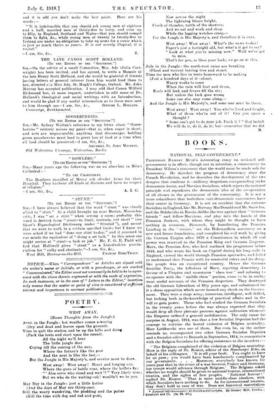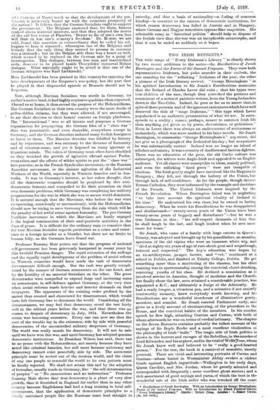BOOKS.
NATIONAL SELF-GOVERNMENT.*
PROFESSOR RAMAN' Musa's interesting essay on national self- government is in effect, though not in intention, a commentary on President Wilson's statement that the world must be made safe for democracy. He sketches the progress of democracy since the French Revolution, and he describes the development of the two dangers that confront it—military despotism, masquerading under democratic forms, and Marxism Socialism, which rejects the nat ional principle and repudiates the democratic idea of the co-operation of all classes in the government of the community. It is not a more coincidence that both these anti-democratic movements have their centre in Germany. It is not an accident that the extreme Socialists in England, like Mr. Ramsay MacDonald and Mr. Snowden. and the Bolsheviks in. Russia dislike the war against. their " (Seeman friends " and fellow-Marxiens, and play into the hands of the Prussian Junkers, wills whom they might be thought to have nothing in common. Bismarck, by humiliating the Prussian Landtag in the " sixties," set the Hohenzollern autocracy on a new and firmer foundation, and completed his evil work by giving the German Empire after 1870 a Constitution in which all real power was reserved to the Prussian King and German Emperor. Marx, the Prussian Jew, who had outlined his programme before 1848, and who wrote his book on Capital during his long exile in England, viewed the world through Prussian spectacles, and foiled to understand that Prussia with its masterful riders and its sheep- like people was an exceptional country. Hence the Gorman Socialist Party, the followers of Marx, rejecting democracy is favour of a Utopian and monstrous " clam war " and refusing te co-operate with the " middle-class " parties, came to be in reality most useful servants of the Prussian despotism. They destroyed the old German Liberalism of fifty years ago, and substituted far it a sham opposition which never formed any check on the Govern- ment. They were a stage army, numerous, intelligent, well drilled, but lacking both in the knowledge of practical affairs and in the will to gain power. Those who had studied the German Socialists in the twenty years before the war always expected that they would drop all their platonic protests against militarism whenever the Emperor ordered a general mobilization. The only cause for surprise in August, 1914, was that a few Socialist Deputies had the courage to criticize the brutal violation of Belgian neutrality. Herr Liebknecht was one of them. But even he, as the author reminds us, accompanied two other German. Socialist Deputies and a Socialist editor to Brussels in September, 1914, to remonstrate with the Belgian Socialists for offering resistance to the invaders :-
" The Belgians complained of the violation of Belgian neutrality. Here is the reply of Dr. Koster, editor of the Hamburger Echo, on behalf of his colleagues. It is all your fault. You ought to have let us pass ; you would have been handsomely compensated by our government. . . . Moreover, everybody has known for years past that in the event of a war between France and Germany, our troops would advance through Belgium.' The Belgians asked whether no weight should be given to national honour, international treaties, and the rights of free peoples. National honour) ' replied Dr. Koster. ' That is mere middle-class idealism, with which Socialists have nothing to do. As for international treaties, they don't hold in case of war. Does not historical materialism
• National Self-Gov.-rnment ; its Grordi and Pei:triple% Nilson's:I Muir. London : Constable and Co. 18s. dd. net.]
(lie ecchine of Marx) teach us that the development of the pro- tariat is intimately bound up with the economic prosperity of the nation ? It follows that the German Socialists ought to support the government.' The Belgians answered that, for them, honour ranked above material interests, and that they adopted the motto of the old free towns of Flanders, ' Better to die of one's own free will than to lose one's country's freedom.' Dr. Kcster, we are told, found this assertion so extraordinary that he called his col- leagues to hear it repeated ; whereupon one of the Belgians said bitterly that the only thing they seemed to possess in common was a stomach ; but on the Belgian side there was a heart as well, which seemed to be replaced on the German side by a point of interrogation. This dialogue, between free men and materialised serfs, deserves to be placed beside Thucydides' immortal Malian dialogue. What especially ought to be noted is that one of the German delegates was Karl Liebknecht."
Herr Liebknecht has been praised in this country for opposing the later developments of the Emperor's war-policy, but the part that he played in that disgraceful episode at Brussels should not be forgotten.
Now, although Marxian Socialism was sterile in Germany, its author's native land, it had highly explosive qualities when exported. Abroad as at home, it thus served the purpose of the Hohenzollerns. The German Socialists in their own country were the most docile of police-ridden citizens, but they were allowed, if not encouraged, to air their theories to their hearts' content on foreign platforms. The " International " was to all intents and purposes a German organization for propagating the German idea of a "class war " that was permissible, and even desirable, everywhere except in Germany, and the German theorists induced many foolish foreigners to listen to them. The Marxian doctrine was falsified by history and by experience, and was contrary to the dictates of humanity and of common-sense, and yet it imposed on many ignorant or impatient minds. The rulers of Germany must often have chuckled as they watched the growth of agitation abroad against Parlia- mentarism; and the efforts of wilder spirits to put the " class war " Into practice, as in the French Syndicalist movement, or the Russian Anarchist movement, or the sinister agitation of tire Industrial Workers of the World, especially in Western America and in Aus- tralia. It was to Germany's interest, so her rulers thought, that all the democratic countries should be perplexed by this anti- democratic ferment, and compelled to fix their attention on their own domestic problems, while Germany was completing her military preparations for the war in which she was to secure world-dominion.. It is natural enough that the Marxians, who before the war were co-operating, consciously or unconsciously, with the Hohenzollerns, should now be trying to save Germany from the ruin which will be the penalty of her awful crime against humanity. The pro-German Pacificist movement in which the Marxians are busily engaged is the logical continuation of their anti-patriotic activities in the days of peace. It is difficult for the ordinary man to conceive that the true Marxian Socialist regards patriotism as a crime and resist- ance to a foreign invader as a blunder, but there are no limits to human folly, as the Germans have found out.
Professor Ramsay Muir points out that the progress of national self-government has been grievously hampered in recent years by this twofold Prussian danger. The rapid extension of the suffrage and the equally rapid development of the problem of social reform in Western countries would have made the task of democratic Governments difficult enough. But the task was greatly compli- cated by the menace of German armaments on the one hand, and by the hostility of an unsocial Socialism on the other. The great democracies were compelled to expend large and increasing sums on armaments, in -self-defence against Germany, at the very time when social reforms made heavier and heavier demands on their taxpayers. The opponents of the existing order profited by the unrest thus created and clamoured for disarmament, which would have left Germany free to dominate the world. Considering all the circumstances, we may feel that democracy stood the test fairly well in the critical years before the war, and that there was no reason to despair of democracy in July, 1914. Nevertheless the strain was becoming excessive. Every one can now see that the root of the trouble lay in 'the existence, side by side with peaceful democracies, of the uncontrolled military despotism of Germany. The world was really unsafe for democracy. It will not be safe until we have won this war, and until Germany has adopted genuine democratic institutions. As President Wilson has said, there can be no peace with the Hohenzollerns, not merely because they have acted like criminal lunatics, but still more because autocracy and democracy cannot exist peacefully side by side. The autocratic principle must be rooted out of the modern world, and the claim of any one people to remould the world to its own pattern must be finally rejected. We shall not attain this end by the adoption of formulae, usually made in Germany, like " the self-determination of peoples " or " No annexations and no indemnities." Professor Ramsay Muir shows that true democracy is a plant of very slow growth, that it flourished in England far earlier than in any other country because Eneishmen had had a long training in local self- government, that the application of democratic principles to a wholly untrained people like the Russians must lead straight to
anarchy, and that a basis of nationality—a fueling of common kinship—is essential to the success of democratic institutions, for which reason democracy has failed in Austria and in .Hungary, where German and Magyar minorities oppress-Slav majorities. His admirable essay in " historical polities " should -help to dispose of the foolish view that the war was an inexplicable eatastrophe, and that it can be ended as suddenly as it began.











































 Previous page
Previous page